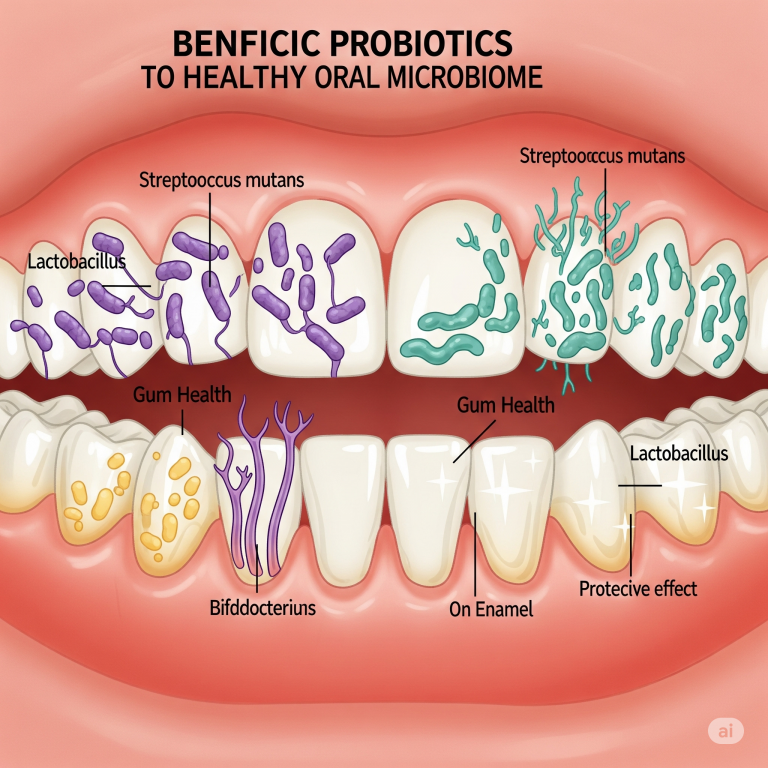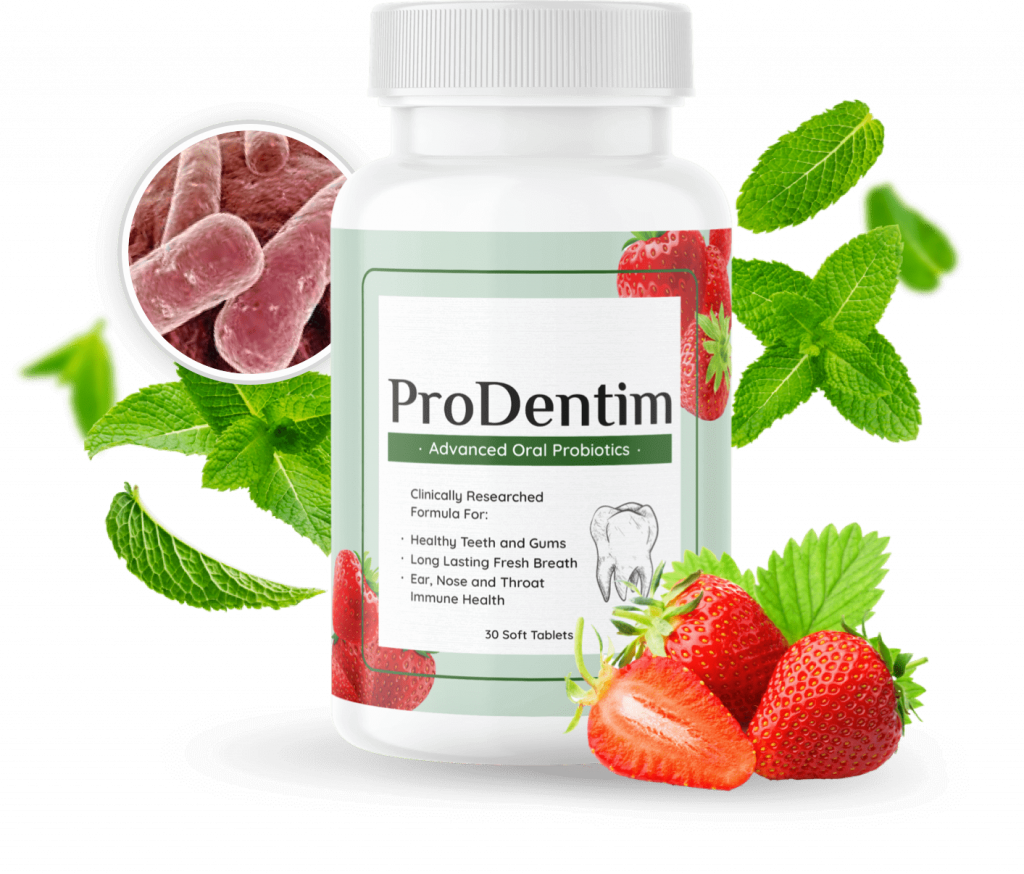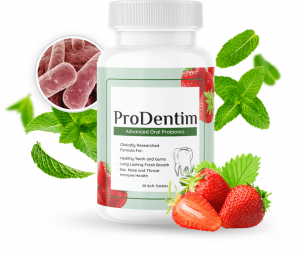📰 New Research Uncovers Hidden Cause of Gum Bleeding and Bad Breath
Bleeding gums, bad breath, and sensitive teeth may all share a hidden root cause most treatments fail to address — but new research is shedding light on a natural alternative.
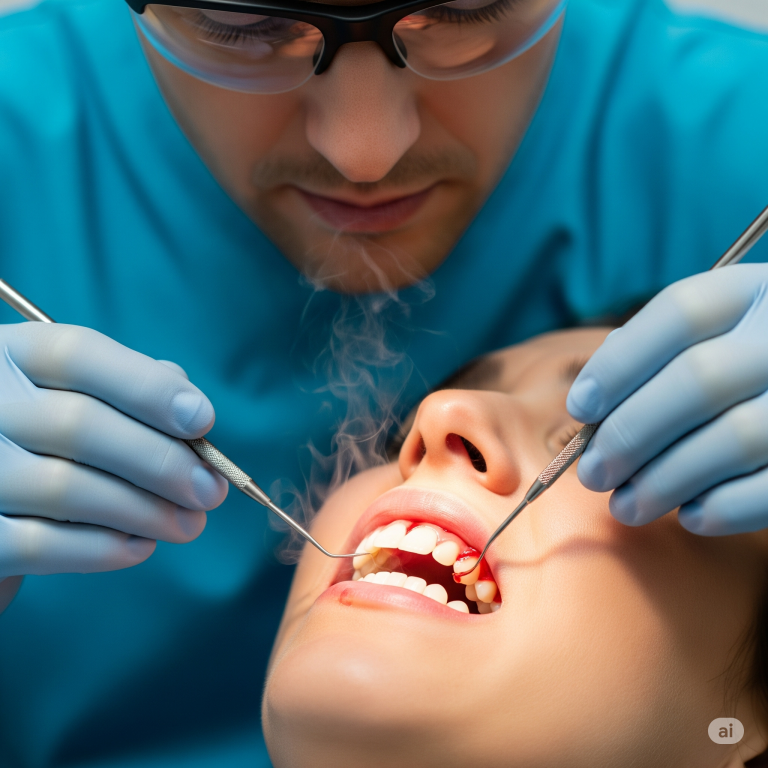
Your teeth may be facing silent threats. Your gums bleed. Your breath causes discomfort. And yet… you still believe it’s just “part of getting older”?
You follow everything you’ve been told: brushing three times a day, flossing carefully, rinsing with mouthwash, visiting the dentist regularly.
And yet:
Your gums still bleed and show signs of irritation.
That unpleasant breath makes you instinctively cover your mouth in conversations.
A bitter taste seems to linger, even after cleaning.
And more alarming: your teeth — those that should last a lifetime — are becoming increasingly sensitive.
If any of these signs sound familiar, know this: it’s not your fault.
But the longer the real cause remains unaddressed, the greater the risk not only to your teeth — but to your long-term health and quality of life.
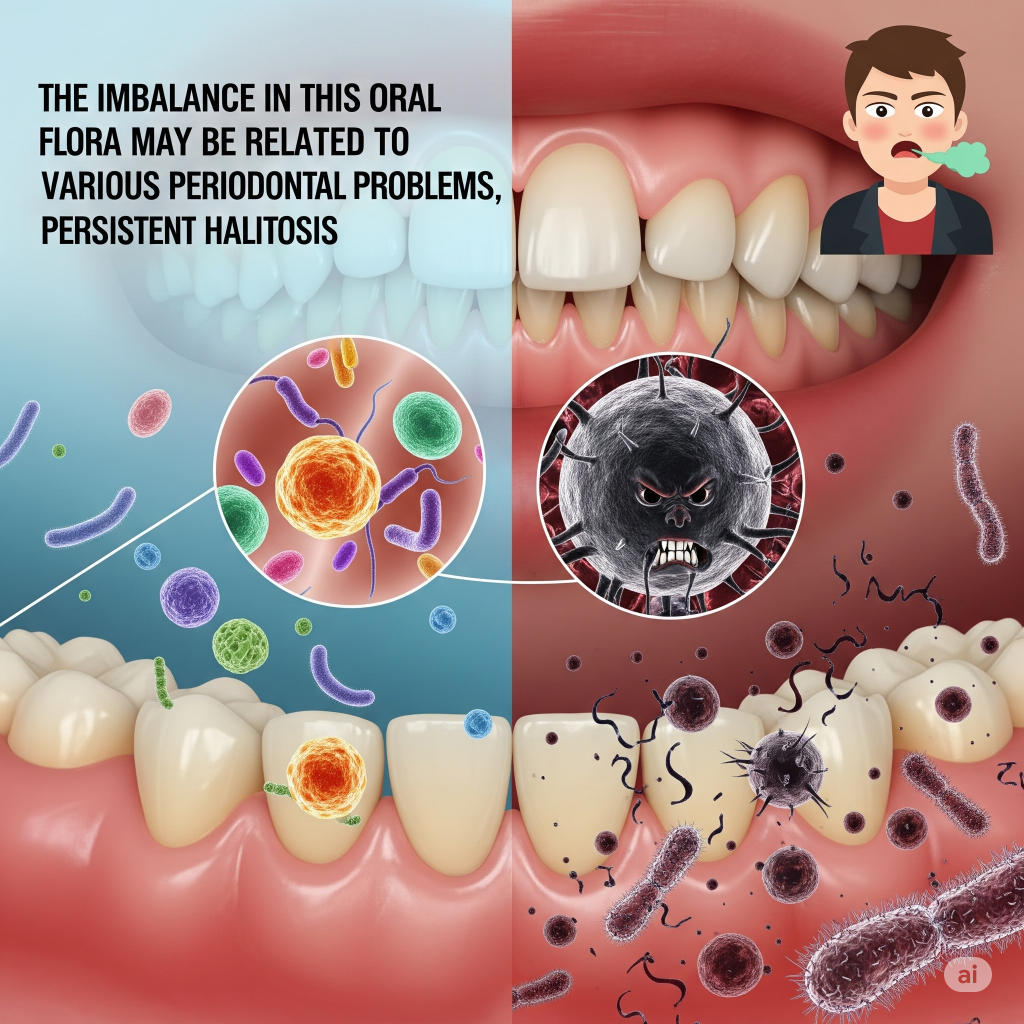
🧬 The Truth About Your Mouth That Deserves More Attention
What many professionals don’t have time to explain during that routine check-up is that your mouth harbors a complex ecosystem with hundreds of different types of bacteria. It’s a true microscopic community where there exists a delicate balance between beneficial bacteria – which protect your teeth and gums – and others that are potentially harmful.
Studies published in the respected Journal of Oral Microbiology indicate that imbalance in this oral flora may be related to various periodontal problems, persistent halitosis, and potentially associated with broader health issues.
And here’s an important point: this balance may not be completely restored just with regular toothpaste, floss, or isolated treatments. Some oral hygiene products, including certain mouthwashes, can also affect the beneficial bacteria in your mouth, which deserves attention.
🦷 “Your Teeth Are Sending Important Signals – Listening to Them Could Be a Transformative Decision”
“The mouth is not just a set of teeth and gums isolated from the rest of the body. It is an integrated part of your overall health. When something is imbalanced in your oral cavity, the entire organism can be affected – in ways many don’t imagine.”
— Dr. Robert Mitchell, dental surgeon with experience in oral pathology
Let’s be clear: discomfort when chewing, gum bleeding when brushing, sensitivity to cold or heat, and breath that persists even after hygiene deserve attention at any age. These symptoms are important signs that something may be imbalanced – and the situation can evolve if not properly addressed.
How a Simple Inflammation Can Evolve Into More Serious Problems?
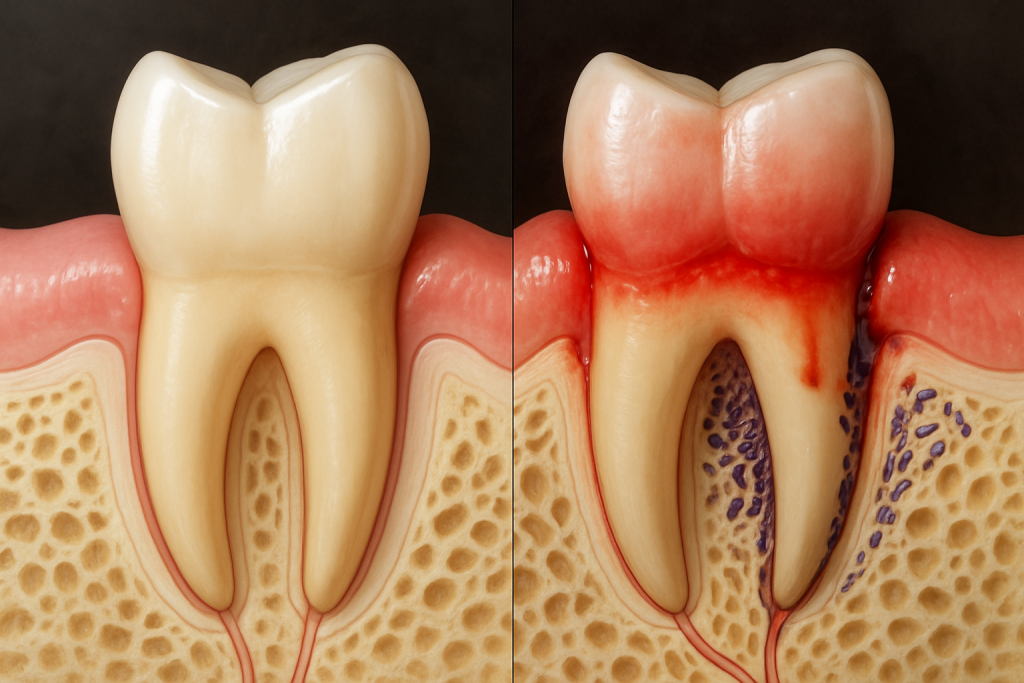
Most oral conditions progress gradually, often without causing significant pain in the early stages. That’s why many people may not give proper attention to the first signs, believing that intensifying brushing or changing toothpaste is enough.
Data from the American Academy of Periodontology indicate that a significant percentage of adults over 30 have some degree of periodontitis – a condition in the gums that can affect the supporting tissue of the teeth.
And an important point: this process generally doesn’t resolve on its own. When the condition reaches deeper structures, the teeth – even those that appear healthy – can show mobility. In advanced stages, conventional treatments may have limited effectiveness.
The Connection Between Oral Health and Overall Well-being
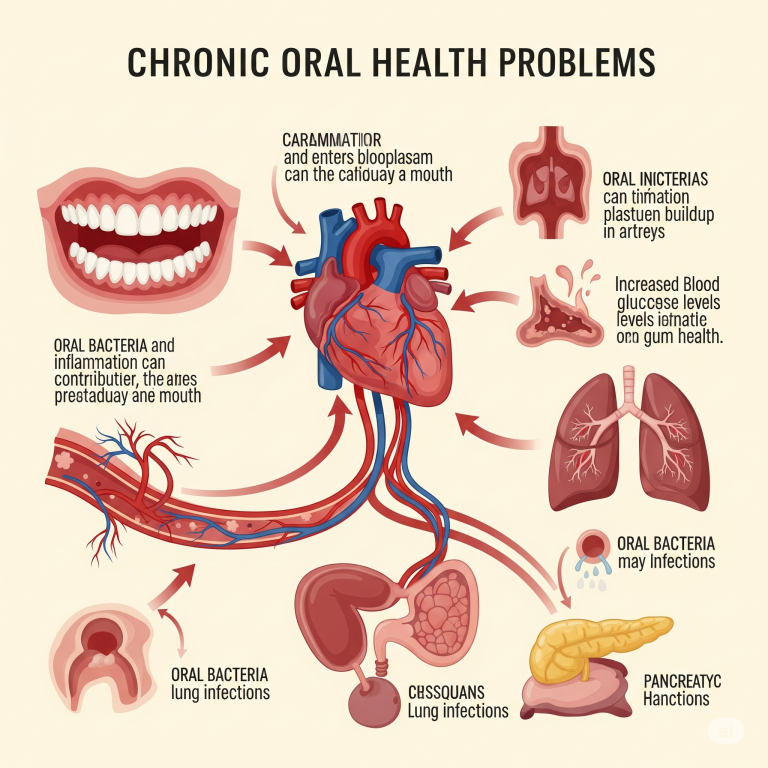
Research conducted by respected institutions such as the Harvard School of Public Health suggests that chronic oral problems may be associated with:
Cardiovascular health: Persistent inflammation in the gums can allow bacteria to enter the bloodstream, potentially relating to the formation of arterial plaques.
Glycemic control: The relationship between oral health and blood sugar control is so relevant that many endocrinologists consider oral health assessment an important component of diabetes management.
Respiratory health: Bacteria from the mouth can migrate to the lungs, potentially contributing to respiratory conditions in predisposed individuals.
Why Conventional Approaches May Have Limitations?
Many people invest in various treatments such as scaling, antibiotics, mouthwashes, and various procedures… without understanding that these traditional methods may focus primarily on symptoms, without necessarily addressing the balance of the oral flora.
The result? The problem may return. And with each new episode, cumulative damage can occur: bone loss, gum recession, dental mobility, need for prosthetics or implants… until reaching a point where treatment options become more limited.
😷 The Emotional Impact of Persistent Oral Problems
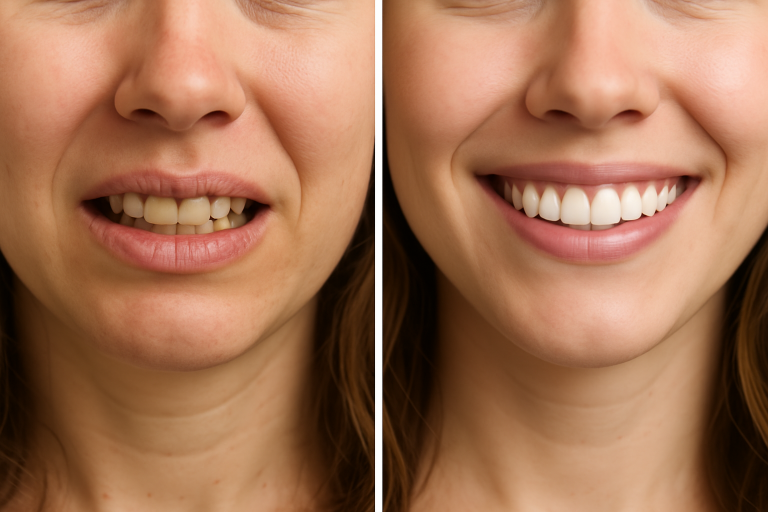
There are aspects that aren’t always discussed in dental consultations. Challenges that go beyond the office.
Like the discomfort when speaking during an important meeting. The embarrassment of keeping distance from people during conversations. The habit of always carrying mints or gum to temporarily mask a constant concern.
The tension during moments of closeness, the fear during a hug, worrying that the person will notice that breath that seems to persist even after brushing, flossing, or using mouthwash.
Over time, this transcends the physical issue. Your confidence can be gradually affected. You limit your smile. You avoid proximity with loved ones. And, little by little, you begin to accept that it’s simply “normal,” “a consequence of age,” or “a result of daily stress.”
But it doesn’t have to be this way. Persistent oral conditions can affect not only your gums or the enamel of your teeth – but your self-esteem, your social life, and your overall well-being.
And when the problem advances, bigger concerns arise. More frequent bleeding. A tooth that shows mobility. A specialist who mentions “periodontitis” and warns about the risks of tooth loss without proper intervention.
Not to mention the possible connections with systemic health – such as potential relationships with cardiovascular conditions and inflammations, as suggested by scientific studies.
And most importantly: many of these situations could be addressed more effectively with complete information from the beginning.
🔬 The Innovative Approach: How Specific Probiotics Can Contribute to Your Oral Health
Imagine your mouth as a vibrant community. Within it, elements that maintain order and balance coexist – but there are also factors that can cause imbalances. This community is your oral cavity. And the “inhabitants” are the billions of bacteria that compose it.
Your mouth harbors a complex ecosystem of microorganisms – some beneficial, others potentially harmful. This collection, scientifically known as the oral microbiota, when in balance, allows these bacteria to coexist harmoniously, contributing to the protection of your teeth, strengthening your gums, and even assisting in the initial stages of digestion.
But this delicate balance can be easily disturbed.
Frequent use of antibiotics, excessive consumption of ultra-processed foods, high levels of chronic stress, smoking, regular consumption of alcoholic beverages, and even the constant use of certain oral products can affect colonies of beneficial bacteria – creating conditions for less desirable microorganisms to multiply.
And it’s in this context that various challenges can arise:
- Persistent breath discomfort that conventional products have difficulty resolving
- Sensitivity in gums that react easily
- Teeth with increasing sensitivity
- Recurrent canker sores, accelerated accumulation of bacterial plaque, tartar formation, and conditions that return even after treatments
Studies published in respected journals such as Nature Reviews Microbiology suggest that “alterations in the oral microbiota may be related to the progression of cavities, periodontal conditions, halitosis, and potentially associated with systemic conditions such as diabetes and cardiovascular health.”
The good news is that science has advanced in approaches to rebalance this ecosystem – using specific probiotics developed for the oral environment.
🦠 How Oral Probiotics Can Act?
Unlike conventional products that focus primarily on eliminating bacteria – oral probiotics seek to restore the natural balance.
They are carefully selected beneficial bacterial strains that, when consumed regularly, can:
Contribute to the colonization of the oral cavity with beneficial bacteria that naturally compete with less desirable microorganisms
Assist in balancing oral pH and neutralizing acidity, creating a more favorable environment for oral health while contributing to enamel protection
Support the body’s natural processes, potentially helping reduce inflammations, discomforts, and accelerating tissue recovery
Help reduce sulfurous compounds – molecules frequently associated with persistent bad breath
Form a natural barrier in the oral mucosa, potentially hindering the adhesion of undesirable microorganisms
In other words: they don’t just temporarily mask symptoms – they seek to restore the natural environment of your mouth, allowing your body to activate its own recovery mechanisms.
📚 Scientific Research Suggests Promising Results
In studies published in respected journals such as Frontiers in Cellular and Infection Microbiology, participants who regularly consumed specific strains such as Lactobacillus reuteri and B.lactis during controlled periods showed interesting results:
Significant reduction in gingival inflammation, with notable decrease in bleeding
Decrease in dental biofilm formation (bacterial plaque), even in hard-to-reach areas
Improvement in breath quality, confirmed by professional evaluations
Potential stabilization of teeth with mild mobility, with improvement in attachment to supporting tissue
Additionally, analyses involving hundreds of participants suggest that regular use of specific oral probiotics can significantly reduce the need for dental interventions in people with a history of recurrent oral problems.
👩⚕️ What Innovative Professionals Are Observing?
“In my clinical practice, I’ve observed that patients with persistent oral challenges such as recurrent gingivitis and halitosis, when incorporating specific oral probiotics into their routine, frequently show significant improvements that other isolated approaches couldn’t provide. It represents an important evolution in preventive dentistry.”
— Dr. Michael Thompson, oral microbiome researcher
“The future of modern dentistry is increasingly focused on understanding the oral microbiome. When you support the natural balance of the mouth by providing specific beneficial bacteria, the body can activate its own recovery mechanisms in a surprising way.”
— Dr. Sarah Williams, periodontist with training in oral microbiology
✅ Real Experiences That Can Inspire Your Journey
“For years, I believed my gum condition was purely genetic and that I would have to live with sensitive gums forever. I even avoided smiling in photos and withdrew from social gatherings because of the discomfort. After starting a protocol with specific oral probiotics, in just a few weeks I noticed that my gums showed much less bleeding and the breath discomfort decreased considerably. For the first time in a long time, I feel more confident when smiling. It was truly transformative for my social and professional life.”
— Jennifer L., 52, university professor
“I was about to extract two lower teeth due to advanced mobility. I had already invested significantly in conventional treatments without lasting results. As a complementary alternative before extraction, I tried a probiotic protocol. After a few weeks, I noticed that my teeth were visibly firmer, and my periodontist was positively surprised by the evolution. I recovered not only dental stability but my ability to chew comfortably and my confidence to smile. I feel a notable difference in my well-being.”
— Richard T., 61, retired engineer
🚨 The Importance of Not Ignoring the Signs of Your Oral Health
Oral conditions generally progress gradually, often without alarming symptoms in the early stages. And when the signs become impossible to ignore, treatment often becomes more complex.
A gum that shows occasional bleeding today can evolve into a periodontal condition that compromises the supporting structure of the teeth.
A persistent breath discomfort that you try to minimize with conventional products may indicate a deeper bacterial imbalance that deserves specialized attention.
A tooth with increasing sensitivity to cold or heat may signal the beginning of a process that, without proper approach, may require more invasive treatments in the future.
The good news? You can take proactive measures now.
And the solution may be more natural and effective than you imagine.
- With a focus on natural balance.
- With comfort and practicality.
- With an approach that goes beyond conventional treatments that only temporarily mask symptoms.
Discover the Full Details and See if This Solution Is Right for You
 Visit the Official Site to Learn More
Visit the Official Site to Learn More
And discover how you can naturally support your oral health with the probiotic protocol that innovative professionals are recommending to address the problem at its root.
Your oral health, your confidence, and your quality of life deserve this special attention.
Note: Results may vary from person to person. Always consult a healthcare professional before starting any new treatment protocol.
🔒 A Guarantee That Reflects Confidence in the Results
One of the most surprising aspects of this solution is the level of confidence behind it.
Unlike many conventional approaches, where patients invest heavily in treatments with uncertain outcomes, this method comes with a 100% satisfaction guarantee backed by a 60-day full refund policy.
In simple terms:
If users are not impressed by the improvements in their gums, teeth, and breath — or even if they simply don’t feel fully satisfied with the transformation — they have a full 60 days to request a complete refund.
No explanations, no questions. Every cent is returned.
This risk-free approach not only reflects the confidence of those behind the formula but also provides peace of mind for those who are ready to give this new science-backed method a chance.
To Learn More: Q&A with Our Experts
What are some common signs of potential oral health issues that are often ignored?
- Bleeding gums when brushing, persistent bad breath that doesn’t go away after hygiene, a lingering bitter taste, and increasing tooth sensitivity are all important signals that something may be imbalanced in your mouth. These symptoms can worsen over time if the underlying cause isn’t addressed.
Why might traditional oral hygiene methods like brushing and flossing not be enough to address some persistent oral problems?
- While brushing, flossing, and regular dental visits are crucial, traditional methods often focus on removing bacteria but may not restore the natural balance of the oral microbiome. Some products, like certain mouthwashes, can even affect beneficial bacteria. Persistent issues like bleeding gums and bad breath may indicate an imbalance that these methods don’t fully resolve, allowing problems to return.
How is the health of your mouth connected to your overall body health?
- The mouth is an integrated part of the body. Imbalances in oral health can have broader impacts. Research suggests chronic oral problems are potentially associated with cardiovascular health (bacteria entering the bloodstream), glycemic control (important for diabetes management), and respiratory health (bacteria migrating to the lungs).
What is the “oral microbiome” and why is its balance important?
- The oral microbiome is the complex community of billions of microorganisms, including both beneficial and potentially harmful bacteria, living in your mouth. A balanced oral microbiome is crucial for protecting your teeth and gums. When this balance is disrupted, it can lead to issues like persistent bad breath, gum sensitivity, cavities, and periodontal problems.
What can disrupt the balance of the oral microbiome?
- Several factors can disturb the delicate balance of the oral microbiome, including frequent use of antibiotics, high consumption of ultra-processed foods, chronic stress, smoking, regular alcohol consumption, and even the constant use of certain oral hygiene products. These can reduce beneficial bacteria, allowing harmful ones to multiply.
How do oral probiotics differ from conventional oral hygiene products?
- Conventional oral products often aim to eliminate bacteria indiscriminately. Oral probiotics, on the other hand, focus on restoring the natural balance of the oral microbiome. They introduce specific beneficial bacterial strains that compete with less desirable microorganisms, help balance oral pH, support natural recovery processes, and reduce compounds associated with bad breath, effectively working to restore the mouth’s natural environment.
What potential benefits are associated with using specific oral probiotics according to research?
- Studies suggest that specific oral probiotics may lead to a significant reduction in gum inflammation and bleeding, a decrease in dental biofilm (plaque) formation, improvement in breath quality, and potential stabilization of teeth with mild mobility. Some research also indicates that regular use could reduce the need for dental interventions in individuals with a history of recurrent oral problems.
What is the guarantee offered for the discussed probiotic protocol?
- The described probiotic solution offers a 100% satisfaction guarantee with a 60-day full refund policy. This means that if users are not satisfied with the improvements in their oral health (gums, teeth, breath) or overall transformation within 60 days, they can request a full refund with no questions asked. This is presented as a risk-free way to try the method.
